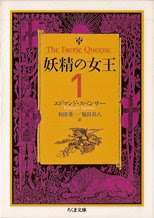Today, rather than grading exams, I decided to finish up the first stanza. It only took me about a month. The last line of a Spenserian stanza is known as an "alexandrine." Whereas the first eight lines are ten syllables long, or five "feet" of--in this case--two (usually iambic) syllables each, the last line of the stanza, with rare exceptions, is an extra long twelve, comprising six feet. This longer line caps off the stanza while simultaneously winding us up for the next one. Here are the last two lines of the stanza in Japanese, which I have less-painstakingly-than-usual figured out how to transcribe:
騎士はいかにも凛々しい武者振りで、馬上槍試合にも
激しい合戦にもふさわしい人らしく颯爽と馬に跨っていた。
And the romaji:
kishi wa ikanimo ririshii mushaburi de, bajou soushigou (?) ni mo
hageshii kassen ni mo fusawashii hitorashiku sassou to uma ni matagatteita.
And the original English:
Full iolly knight he seemd, and faire did sitt,
As one for knightly giusts and fierce encounters fitt.
And now my attempt to retranslate:
The knight indeed by means of dignified gallantry, both for horseback riding spear-attempts and
For violent battles appropriate and honorably dashing his horse was straddling.
More simply:
The truly gallant knight, seeming fit for furious fights
and knightly battles both, dashingly bestrode his horse.
And here's the grammatical breakdown:
騎士 - "kishi" is our old friend "knight"
は - topic particle
いかにも - adverbial, meaning "indeed"
凛々しい - one of many words in this section that means "gallant" or "brave"; the 々 repeats the previous kanji
武者振り - this word also means gallant, but it's an abstract noun, so "gallantry" or "prowess"
で、- a particle that indicates either location or "by means of which" (ablative of means or instrument?)
馬上 - horseback riding
槍試合 - I have no idea how to pronounce or translate this. The first character means "spear" or "javelin," the second means "attempt," and the third, which usually means "harmony" (as in 合気道 "aikido"), is here, unbelievably, maybe, the counter for battles (!)
に - for (like a dative)
も - in this case, "both... and"
激しい - violent, vehement, intense, furious
合戦 - battle, engagement (I guess "meeting" can mean either harmony or war!)
に - for
も - see above
ふさわしい - I think this means "appropriate" but I'm not sure why it's in kana
人らしく- an adverbial form of a -rashii adjective, meaning "humane" or "honorable"
颯爽 - another "gallant" or "dashing" using 爽, which may take the prize for ugliest kanji ever
と - and
馬 - horse!
に - indirect object or other "dative" usage usually, but here it looks like a direct object... the main verb may take に since it's sort of locative/instrumental
跨っていた。- what a pain this one was... usually written 跨ぐ or 跨がる, naturally this text uses the least common 跨る form, which is here rendered in the past progressive: "was straddling"
Spenser's overuse of parallelism is probably what's driving the translators to make such liberal use of synonyms. Well, it's vocabulary-building if anything!
12.17.2008
Subscribe to:
Post Comments (Atom)





No comments:
Post a Comment